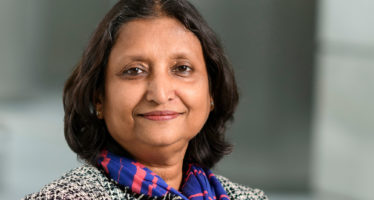World Bank Group Increased Support for Reforms to Accelerate Economic Growth

Islamabad, Pakistan
Annette Dixon, new Vice President of World Bank Group’s South Asia Region made an introductory visit to Pakistan from April 1 to 4, 2015. She called upon Prime Minister Nawaz Sharif and met with the Finance Minister Ishaq Dar and key members of the Economic Team.
Dixon congratulated the government on stabilizing the economy. Successful implementation of the International Monetary Fund program has paved the way for Pakistan once again accessing IBRD loans of $500 million per annum or up to a maximum of $2 billion in the next four years, a 50% increase of the financing envelope to Pakistan. She also acknowledged the government’s initial implementation of reform actions and staying the course of reforms. “The World Bank Group stands ready to assist the government’s efforts to deepen reforms to accelerate growth, reduce poverty and build shared prosperity andaddress the complex challenges facing the country, especially in energy, revenue mobilization and education,“ said Dixon.
Dixon also discussed the government’s emergency response to the 2014 floods and the return of the displaced persons in FATA, and assured the speedy delivery of the World Bank Group support this fiscal year. She also highlighted the need to invest in human development, particularly in education, and the World Bank Group support in improving service delivery at a faster pace. Increased revenue mobilization will enable the government to expand its investment in social development and infrastructure.
“The World Bank Group stands ready to assist the government’s efforts to deepen reforms to accelerate growth, reduce poverty and build shared prosperity and address the complex challenges facing the country, especially in energy, revenue mobilization and education.”
Dixon welcomed the government initiatives for enhancing Pakistan’s regional economic cooperation and acknowledged the progress made in implementation of the Central Asia-South Asia initiative (CASA1000). She reiterated the World Bank Group support for broadening the regional connectivity of Pakistan and its neighbors toward a more integrated regional energy market. She encouraged Pakistan to sustain and share its experience of the social protection program, through the Benazir Income Support Program (BISP) which is global best practice for targeting the poorest of the poor. Dixon was keenly interested in the technology based registration and verification systems during her visit to a BISP beneficiary registration center in Lahore.
Dixon participated in a roundtable discussion on financial inclusion along with Finance Minister Ishaq Dar and State Bank Governor Ashraf Mahmood Wathra, and welcomed the invitation of the Governor to the World Bank Group to support the implementation of the National Financial Inclusion Strategy, which aims to provide access to finance to at least half of the adult population by 2020.
Dixon also met the Chief Minister of Punjab Shahbaz Sharif and acknowledged the World Bank Group’s strong development partnership with the province and the well performing World Bank-supported programs in the social, irrigation, rural and urban development sectors. She also appreciated the provincial government’s focus on governance and transparency, and on promoting small and medium enterprises for jobs creation. They both agreed that swift implementation of reforms is needed to enhance competitiveness and create jobs including through skills development so as to help the province achieve a faster pace of growth. Claudia Costin, the World Bank Group’s Senior Director of the Education Global Practice joined the discussion with Chief Minister Shahbaz Sharif.
Dixon also met with Chief Minister of Balochistan Abdul Malik Baloch in Islamabad. Dixon assured the World Bank Group’s continued assistance for Balochistan’s development particularly in education especially for girls, nutrition, immunization, management of water resources, and the minerals sector.
Dixon held several meetings in Islamabad and Lahore with representatives of diplomatic missions, development agencies, academia, think-tanks, private sector and civil society to deepen her knowledge of the country.
Dixon joined the Bank in 1999 before which she held senior positions in the Government of New Zealand. She concluded her visit on Saturday.
You may have an interest in also reading…
World Bank: The Digitalisation of Capital Markets Can Boost Bond Market Efficiencies
Since its creation in 1944, the World Bank has issued bonds to raise funds from private investors that have mobilised
IMF | Gulf Cooperation Council: Economic Prospects and Policy Challenges for the GCC Countries
Executive Summary The already sluggish global recovery has suffered new setbacks and uncertainty weighs heavily on prospects. The euro area
Johannesburg Stock Exchange: Pioneering Sustainable Development
Shifting attention away from the next quarter’s results towards sustainability parameters indicative of long-term objectives, has been a challenge for

















































































